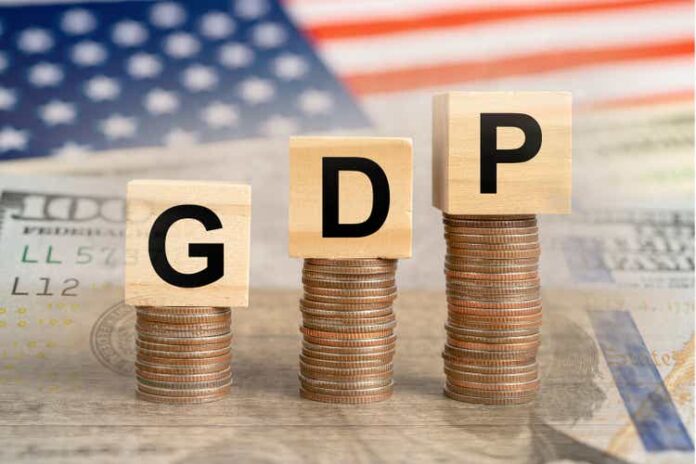sasirin pamai
Pay attention under or at the cross on Apple Podcasts and Spotify

Q1 GDP -0.1% as tariff frontloading bites, however there’s underlying power. (0:15) The Fed’s favourite inflation gauge is available in cool. (1:38) Taco Bell is the megastar of Yum! Profits. (2:49)
That is an abridged transcript of the podcast.
The U.S. financial system shifted into opposite within the first 3 months of the yr as arrangements for price lists weighed on GDP figures. It used to be the primary GDP contraction in just about 3 years.
The preliminary estimate of Q1 GDP confirmed the financial system gotten smaller at an annual tempo of -0.3%, when compared with +2.4% expansion in This fall and weaker than the +0.2% upward thrust anticipated.
The drop in actual GDP in Q1 mirrored an building up in imports, which used to be telegraphed in the day past’s March business figures, which noticed the U.S. deficit balloon. At the different facet have been will increase in funding, client spending, and exports.
Economist Ernie Tedeschi says, “This file is nearly precisely what an another way wholesome financial system seems like expecting—however no longer but immediately harm through—price lists. Shopper durables spending collapses. Products and services are nice for the instant. Companies get in as many imports as they are able to and top off their inventories.”
Odds of a U.S. recession on Polymarket surged above 70%, the absolute best they’ve been since simply after Liberation Day and up from round 20% in the beginning of March.
However actual ultimate gross sales to personal home clients, which is every so often referred to as core GDP and the sum of client spending and gross non-public mounted funding, higher 3%. That’s a slightly upper than This fall.
Robin Brooks of the Brookings Institute says, “We are dwelling thru an enormous herbal experiment … That is tariff front-running as companies stockpile.”
Additionally at the brilliant facet, the Fed’s favourite inflation gauge cooled greater than anticipated in March.
The March Core PCE Value Index used to be flat vs. a consensus of +0.1% and a +0.5% upward thrust in February. On a Y/Y foundation, the measure, which excludes meals and effort costs, higher 2.6% vs. +2.6% consensus and +3% prior.
However neither underlying GDP power nor a dovish core PCE inspired inventory investors.
Futures tumbled after the GDP print, and the foremost averages are considerably decrease, with the Nasdaq (COMP.IND) down greater than -2% and the S&P 500 (SP500) down greater than -1.5%.
The bond marketplace is keeping up higher, even though. The ten-year Treasury yield (US10) is above 4.15%.
Amongst energetic shares. Taco Bell used to be the megastar for Yum! Manufacturers (YUM), which experiences a slight leave out in Q1 earnings.
Identical-store gross sales expansion used to be sure for Taco Bell (+9%) and KFC (+2%), however fell for Pizza Hut (-2%). The Addiction Burger Grill Department used to be flat for the quarter. Total, comps rose 3.0% to edge above the consensus of +2.9%.
Tremendous Micro Pc (SMCI) is plunging after the AI server maker reported initial third-quarter gross sales that have been hampered through delays.
“All the way through Q3 some behind schedule buyer platform selections moved gross sales into This fall,” the corporate stated in a remark. As such, Tremendous Micro’s GAAP and altered gross margins have been 220 foundation issues less than in the second one quarter, in large part because of “upper stock reserves as a consequence of older technology merchandise and expedite prices to allow time-to-market for brand spanking new merchandise.”
And Western Virtual (WDC) is without doubt one of the easiest S&P gainers after its outlook beat estimates.
The corporate expects fiscal fourth-quarter earnings to be within the vary of $2.45 billion plus or minus $150 million. Consensus is for $2.35 billion. Non-GAAP EPS is observed within the vary of $1.45 (plus or minus $0.20) with the consensus at $1.14.
In different information of word. Space Republicans have proposed new charges on electrical cars as a mechanism to gather earnings to fix federal roads and bridges. House owners of fuel and diesel automobiles already pay a an identical rate of 18.3 cents according to gallon once they acquire gas.
The Space Transportation and Infrastructure Committee’s reconciliation invoice draft outlines new annual registration charges for 3 kinds of cars, beginning within the subsequent decade. Electrical cars would see a $200 rate, hybrid cars would have a $100 rate, and different automobiles would have a $20 rate. The ones charges would cross up on an annual foundation to account for inflation.
The brand new charges are estimated to boost no less than $50 billion over the following decade, in line with estimates—39 states within the U.S. already rate a rate on electrical cars for street maintenance.
And within the Wall Boulevard Analysis Nook. Wells Fargo strategist Chris Harvey says markets could have reached a long-term backside previous this month. He pointed to decreased investor panic and making improvements to sentiment round tariff negotiations.
The hot possibility aversion efficiency signaled a momentary soar, and Harvey now perspectives the marketplace as working inside a large 5,000–5,600 buying and selling vary — a zone they’re calling the “Trump collar” pending additional readability on business coverage.
He’s additionally upgrading the Utilities (XLU) sector to Obese from Impartial whilst downgrading Shopper Staples (XLP) to Impartial from Obese. The shift favors endured low-volatility publicity however tilts towards Utilities in accordance with stepped forward relative valuations, sensitivity to tariff trends, and rising connections to AI infrastructure.
Duke Power (DUK), Atmos Power (ATO), CMS Power (CMS), NiSource (NI), and Evergy (EVRG) all get Obese rankings from Wells Fargo analysts.









